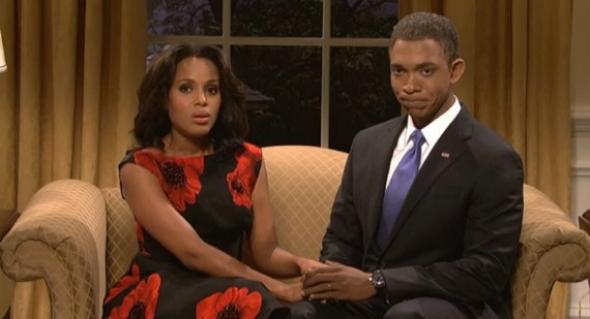Saturday Night Live Addressed Its Race Problem With Humor. That’s Not Enough.

NBC
Saturday Night Live has a race problem. There are no black women in its cast and just two black men, impersonation specialist Jay Pharoah and Kenan Thompson, who has been on the show for 11 years. In a controversial interview earlier this year, Thompson said the show employed no African-American women because “in auditions, they just never find ones that are ready.” This interview and the reactions to it, coupled with SNL’s decision to hire six white actors during the off season, has brought race, long an issue on SNL—the show has had three black women in its entire history; it currently employs 23 writers, four of whom are women, one of whom is black—to the fore.
The first episode of this season had a game show sketch called “New Cast Member or Arcade Fire,” in which Lorne Michaels joked about the lack of diversity. The New York Times ran a story last week by Jason Zinoman titled “For SNL cast, being diverse might be better than being ‘ready.’ ” In it, Zinoman described the vertiginous feeling of watching last week’s sketch, in which Pharoah played a newly freed slave at the beginning of Reconstruction lamenting white people’s continued racism two whole weeks after the end of the Civil War on a show that, 140-odd years later, has no black women and just two black men appearing on camera.
Last night, with Scandal’s Kerry Washington hosting, SNL decided to address the lack of African-American women on its cast directly in the divisive cold open. It was a funny sketch in a generally solid, racially aware episode (Pharoah and Thompson had much more screen time than usual) that still smacked right into the limitations of humor: At some point, even good jokes aren’t good enough. Cracks about the show’s lack of diversity, however well executed, don’t make the show diverse.
In the sketch, Washington, who began by playing Michelle Obama, kept having to run off stage to change costumes because there was no one else who could play the other black women in the scene. While off-stage transforming from Michelle Obama into Oprah, a scroll came on the screen that read, “The producers of SNL would like to apologize to Kerry Washington for the number of black women she will be asked to play tonight. We made these requests both because Ms. Washington is an actress of considerable range and talent and also because SNL does not currently have a black woman in the cast. As for the latter reason, we agree this is not an ideal situation and look forward to rectifying it in the future … unless, of course, we fall in love with another white guy first.” As Washington was off camera changing from Oprah into Beyoncé, six Matthew McConaugheys appeared—SNL has no shortage of those—and the real Al Sharpton arrived to say, “What have we learned from this sketch? As usual, nothing.”
I thought it was a sharp, funny bit that, as Sharpton said, was ultimately meaningless. There’s nothing wrong with being self-aware, but there is nothing particularly right with it either. In 12-step programs, acknowledging that you have a problem is generally the first step toward getting better—but then you have to take all the other steps, and the most important one is quitting your terrible habit. SNL can tease itself all it wants, but it’s just empty charm until it goes out and hires some black women (and recognizes the bias inherent in its “love” of white guys) and then gives those women the institutional support they’re going to need, after being hired into such a high-stakes, over-determined, and sure to be scrutinized position.
The sketch reminded me of a scene from this past week’s Scandal: Washington’s Olivia Pope was advising the adulterous president on what to say at the White House Correspondents’ Diner. She told him to laugh so hard at himself, no one in the room could laugh at him. It’s sound crisis management—make fun of yourself before anyone else can—and it’s exactly what SNL is doing: managing a crisis of its own creation with humor, when what it really needs to do is manage this crisis with some new hires. (And that should be plural—the use of the singular in the opener’s scroll was alarming. One black woman would still have to do a lot of costume changes.)
Everything else objectionable about SNL’s lack of diversity aside, it’s a show increasingly dedicated to topical humor and impersonations, and it can not put on a sketch about any black woman, famous or otherwise, unless it puts a cast member in drag or blackface or has an African-American woman hosting. Last night, Washington ably played a wide range of characters—Michelle Obama, Oprah, a Spellman professor, a “sassy” black woman, a game show host, a Ugandan, a high school teacher. Some of the sketches were good, some were very bad, but the breadth of them demonstrates just how much comedy SNL is leaving on the table by being so white. If nothing else, you would think Lorne Michaels would care about that.

